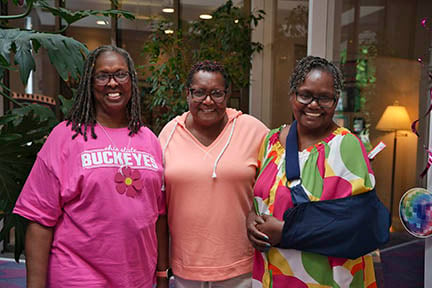We know that a cancer diagnosis is difficult on patients, but we also know it is as equally challenging on their caregivers. Cancer Support Community is aware of the toll that cancer takes on everyone who is affected by it, so here is a list of tips from UC San Diego Moores Cancer Center designed to help ease caregiver stress.
- Give yourself and your loved one time to adjust to the diagnosis.
- A positive attitude is beneficial for you and your loved one.
- Giving care to a loved one with cancer requires patience, flexibility, courage and a good sense of humor.
- Good communication is essential to learning how to best work with your loved one.
- Plan special times together away from the routine of treatment, such as a special evening out for dinner, a movie or play, etc.
- Talk about the future. Hope is very important.
- Being a caregiver can reveal hidden strengths, and enrich your family life.
- As a caregiver, you can choose to take the primary caregiver role or, depending on the level of support from family and friends, divide it between two or more persons.
- Being a caregiver can affect you emotionally, physically and financially. For guidance, speak with your cancer center social worker.
- To better understand your loved one’s diagnosis, treatment and progress, be an active participant during clinic visits.
- Stay organized (e.g., use a journal or notebook during your loved one’s appointments).
- Encourage your loved one to engage as much as possible in normal daily activities.
- Give yourself permission to feel emotions about your loved one’s situation, and confide in a friend or counselor to provide insight and support.
- Set up a list of activities that your family or friends can sign up to do weekly or monthly.
- To help reduce your stress, make time for regular exercise, meditation or some other form of relaxation.
- If care is long-term, arrange for extended periods of relief (e.g., take a vacation).
- Attempt to maintain as much of your routine as possible, but recognize that you may need to alter some of your daily activities if you are the primary caregiver.
- Take advantage of caregiver support groups and credible websites for resources and support.
- Taking care of YOU is important too. Get adequate rest and nutrition, and take time for personal care.
- Select funny movies to watch together. Good humor is healthy for the body and soul.
- Allow yourself private time to do nothing, or something important to you.
- Spiritual support through prayer or the guidance of a spiritual leader can be good medicine.
- Designate a family member or friend who can help field phone calls regarding your loved one’s progress.
- If you have children in the home, assign them age appropriate tasks to accommodate the necessary changes in the household routines.

